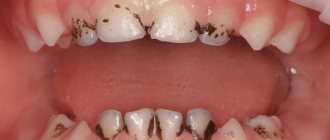Article:
Parents often notice that their child cannot concentrate on one thing for a long time. It manifests itself as forgetfulness and increased physical activity. Typically, this behavior is typical for preschoolers and schoolchildren and does not pose any threat. But sometimes these symptoms indicate dissipated attention syndrome in children (MSD), which must be treated promptly. Otherwise, in the future, signs of the syndrome may affect the learning process and many aspects of a person’s life.
Common signs of SAD in children
The syndrome is accompanied by impaired mental activity. The student lacks concentration and cannot do one thing for a long time. Disturbances in social activity begin to appear: he may be withdrawn and thoughtful or, conversely, overly active.
Out of one hundred children, fifteen typically suffer from attention deficit disorder, which manifests itself in a variety of ways. The first signs of deviation can be detected between the ages of four and nine years, but can occur earlier. For example, a one-year-old baby may be overly active, but at the same time his concentration is impaired. At the age of three years, speech problems may appear.
It is worth remembering that manifestations of attention deficit may be different. There are the following types of violation:
- Only lack of attention;
- Impaired attention and impulsivity (mood often changes, can be irritable and aggressive);
- Attention deficit and hyperactivity (restlessness, constantly distracted by something);
- The mixed variety is the most difficult. Behavior is unpredictable, intellectual function is impaired.
What to do if a child is distracted and inattentive?
Symptoms of poor attention development in a child:
- he cannot concentrate on one subject or activity for a long time, he is constantly distracted, abandons unfinished tasks;
- does not remember what happened in class or what the teacher talked about;
- during classes he is distracted and distracts other students;
- has difficulty retelling the text he has just read;
- often does not understand the task that needs to be completed.
Attention is not an innate, but an acquired property of the mind. It is developed from childhood in the same way as thinking and memory.
Causes of the syndrome
Before treating absentminded attention in children, you need to know what could trigger this illness. Unfortunately, scientists have not yet been able to establish the exact cause, but there are several hypotheses indicating that childhood illness may manifest itself due to the following factors:
- Hereditary predisposition. There is a gene responsible for behavior. Some of its features may cause manifestations of attention deficit.
- Trauma at birth. This may include brain damage, prolonged labor, asphyxia (oxygen starvation).
- Diseases of the expectant mother. If the mother was ill with something during pregnancy, this can lead to impaired fetal development, hypoxia and other negative consequences.
- Bad habits. During pregnancy, the mother could smoke, drink alcohol or use drugs.
- Rhesus conflict. It occurs if the mother’s Rh factor is negative and the baby’s is positive.
- Diseases of internal organs. In particular, the brain, kidneys, heart.
This syndrome is often associated with hyperactivity. And this is not without reason; with attention deficit, a person is too emotional, restless, and there is increased excitability. These signs also apply to hyperactive children.
Symptoms of distracted attention
The set of symptoms of absent-minded attention in a child directly depends on his character, social living conditions, upbringing, age, and severity of the disorder. Therefore, you first need to be able to correctly recognize the first signs of the syndrome. They may be:
- Inability to concentrate for a long time both at home and at school;
- Restlessness and carelessness;
- He cannot understand the words spoken to him or simply does not listen;
- Lack of self-control;
- He finds it difficult to follow rules and instructions;
- Tendency to disorder, things are always scattered on the desk, toys are on the floor;
- When doing something, he is distracted by any little things;
- Absent-mindedness and frequent loss of one's belongings;
- Forgetfulness associated with impaired attention;
- Tendency to anxiety;
- Problems with communication (with children, adults, teachers);
- Impatience and obsession;
- Increased speech activity, and the child cannot listen to the interlocutor and interrupts him;
- Inability to learn, new information is not perceived in full, difficulty in writing;
- Cannot finish what he starts;
- Bad behavior, the child is noisy, constantly spinning and waving his arms.
It is very important to monitor your child and at the first symptom that appears, begin to pay more attention to him.
Article:
Absent-mindedness is a mental state characterized by a lack of concentration and attention.
Absent-mindedness is usually the result of poor upbringing. If a child is accustomed to order, has learned the skills of discipline and organization, and is used to it, he cannot finish what he has started and will be absent-minded. And vice versa, if parents violated the regime, and the disorder in the child’s corner and his forgetfulness are regarded as trifles, then disorganization and absent-mindedness imperceptibly appear in the preschooler’s behavior. These qualities will have a particularly negative impact at school age. It is difficult for an absent-minded student to learn, he is distracted, does not listen to the teacher’s explanations, and may not complete assignments. What can be done to cultivate attention and overcome
absent-mindedness. First of all, you should not reproach a preschooler and punish him for lack of concentration and forgetfulness. It is necessary to patiently train him in correct behavior and teach him to overcome his shortcomings. To do this, a clear daily routine must be strictly observed.
The regime does not allow you to change activities depending on your mood; it requires you to focus your attention and will on the work you have started and bring it to the end. Gradually, following the regime will become a habit, the child will learn to take responsibility for his responsibilities.
To cultivate concentration, it is important to create external conditions and eliminate anything that can distract the child. Parents are sometimes to blame for their children's absent-mindedness. For example: during classes in the next room they turn on a tape recorder, a TV, and the child is also mentally with them, from time to time he leaves his classes and looks in on them. It is important not to distract children from their work and respect their work. Of course, it is not always possible to eliminate what interferes. It is necessary to learn to remain focused in any circumstances. A child can show concentration and attention only in something that captivates and captivates him. He loves to make crafts and take care of flowers. Such activities should be encouraged. This gives the child a sense of responsibility.
Attention and concentration are better trained in the game. For example, take a lot of small objects and scatter them on the table. Let the child remember what things are on the table. Cover everything with a sheet of paper and ask them to name what lies underneath it. Show each named item.
Sometimes a child's absent-mindedness is caused by illness or weakness of the body. In this case, it is necessary to strengthen the child’s health, improve his nutrition and rest. Absent-mindedness can be caused by a bad mood. It all depends on the situation in the family, in the kindergarten. From the relationship between parents.
Features of the diagnosis of SRV
Distracted attention syndrome is a behavioral disorder, not a mental disorder, so establishing an accurate diagnosis can be problematic. Individual manifestations may arise due to improper upbringing or personal characteristics.
It is necessary to resort to subjective diagnostic methods, among them are:
- Special questionnaires. They must be filled out not only by the student, but also by parents and teachers.
- Observation. It is necessary to monitor behavior while staying somewhere and at home.
- Psychological examination. It is important to identify intellectual abilities and skill impairments.
- Identification of diseases. Perhaps early illnesses of the child or his mother could have caused the appearance of this disease.
You need to make sure that your child has absent-mindedness syndrome, because restlessness and activity are also common in many healthy children. There is no doubt about the presence of the disease in the following cases:
- Constant symptoms of the disorder not only at home, but also at school, while out and about.
- Parents discovered the first signs in preschool age, and they did not go away for six months.
- Attention disorder interferes with a child’s learning; he cannot adapt normally to a team.
Treatment methods
We'll tell you what to do if your child has distracted attention. There are several correction methods. First of all, you need to remember about an integrated approach: one thing is not enough; you may need both drug therapy and sessions with a psychologist.
Proper nutrition and adherence to a convenient training regimen play an important role. At this time, a lot depends on both parents. Not only the mother, but also the father should participate in the fate of the child. They must create a daily routine for their child and always find time for him. This is the only way to raise a completely healthy child.
Medication method
Medicines are not always prescribed, only if serious attention problems have been identified in the child, worsening his quality of life and preventing him from socially adapting to the team.
Under no circumstances should you prescribe medications for your child on your own, even if there are many laudatory reviews about them. The medicine should only be prescribed by the attending physician!
Taking some sedatives may be indicated to reduce children's nervous excitability. In childhood, potent drugs are contraindicated, therefore, along with sedatives, they may prescribe tablets aimed at improving brain activity, for example, Glycine (an alternative is Biotredin), or improving blood supply to the brain (Phenibut).
Schedule
If a child suffers from lack of attention syndrome, then a clear daily routine is indispensable. Parents must demand that their children comply with it. This is the only way to instill discipline, which is sometimes absent even in healthy children.
The daily routine should be compiled and printed, hanging in a place convenient for the child, for example, above a desk or bed. Be sure to leave a few hours of free time so that the child can do what interests him.
Here is an example of a daily routine, you can change it according to your preferences:
| Time | Action |
| 07:00 — 07:05 | The child wakes up |
| 07:05 — 07:20 | Exercise, hygiene |
| 07:20 — 07:35 | Breakfast |
| 07:35 — 08:00 | Getting ready for school |
| 08:00 — 08:30 | Road to school |
| 08:30 — 13:05 | Lessons |
| 13:05 — 13:30 | Way home |
| 13:30 — 13:40 | Changing clothes, hygiene |
| 13:40 — 14:00 | Dinner |
| 14:00 — 16:00 | Free time, sections |
| 16:00 — 18:00 | Doing homework |
| 18:00 — 18:30 | Dinner |
| 18:30 — 20:00 | Free time |
| 20:00 — 21:00 | Preparation for sleep |
| 21:00 — 07:00 | Night sleep |
If poor attention and excessive activity interfere with studying in a regular school and communicating normally with his peers, then it may make sense to transfer him to an institution where he is taught according to an adapted program, or switch to home schooling. To make such a decision, you need to consult with different specialists to hear several opinions.
Classes with a psychologist
This stage should not be neglected - it is mandatory. A psychologist will help you get rid of excessive emotionality and impulsiveness. The child will become calmer, behave better, be able to adapt better in a given situation, and will try to concentrate in classes.
Usually classes with children are carried out in a playful way. The psychologist models certain situations and closely monitors the child’s behavior. If necessary, gives advice on what to do in a specific situation.
Psychologists also use a variety of relaxing techniques that will help the child get rid of accumulated tension. Therefore, psychological training is very important for attention disorders.
Parental control
Parents should take an active part in the treatment process. A child with an attention disorder requires special upbringing, and first of all, you need to give your child more independence.
The baby must perform certain household duties. Of course, they don’t have to be very complicated; they are selected depending on the age and physical fitness of the child. You need to give him tasks that he can handle, for example, washing dishes, dusting, or putting away toys.
At first, the child may not succeed in everything; you should not actively help him. He must learn to be persistent when trying to complete tasks on his own. Don’t forget about rewards; you need to praise your child for successfully completing a particular task.
You can resort to sports by sending your child to some section or working out with him yourself. Sport helps to waste excess energy for health benefits, and also teaches self-organization and discipline.
How to deal with a child’s inattention at school: advice from a family center psychologist
“He is very capable, talented, but so inattentive,” “Such a wonderful girl, but she can’t sit in one place, doesn’t listen to the teacher,” “It’s like something goes in one ear and out the other.” Unfortunately, more and more parents note that their children find it difficult to concentrate in class, and homework takes a lot of time. Family psychologist Tatyana Matveeva tells how to help an inattentive schoolchild.
A mother asked for help and said that her 8-year-old son, a calm, reasonable boy, began to get very distracted in class. Academic performance has decreased, the student has difficulty perceiving any information. As the workload increased, it was discovered that the boy had serious problems learning to write.
“In a short dictation of five sentences, my child manages to make 16 mistakes! And the main problem is elementary omissions of letters and punctuation marks. This problem, naturally, makes itself felt in other subjects: mathematics, the world around us - wherever you need to write something down. Already in the first grade, my son had twos and threes in his school notebooks. And what will happen next? But as for oral tasks, my son does a great job! He has developed emotional speech, he knows a lot for his age, answers questions well, and can captivate anyone with his story,” the schoolboy’s mother shared her experiences.
Any purposeful activity of a child will be doomed to failure if there is no attention. There are many reasons that contribute to a decrease in its concentration: they can be both internal and external.
Internal are associated with psychological and emotional stress as a result of unpleasant situations or personal fears, thoughts about which do not leave the child. Lack of rest can also lead to loss of concentration.
“External factors include the level of complexity of the task being performed. If it is difficult and voluminous, then the child feels tension, and doubts arise: can I cope? The same effect occurs when the task is too easy: the student simply loses interest in it. Fatigue and excessive workload can also lead to loss of concentration,” explained Tatyana.
Recommendations to help you become more attentive:
Monitor your child's daily routine.
Distribute the load wisely. Remember that the child must sleep at least 7-8 hours a day, get quality rest and have fun.
Try to learn to take into account the student’s biorhythms. Observe at what time of day he is most alert and attentive, and completes his homework faster. Use the most productive periods of time to his advantage and schedule your activities according to this biological clock.
Watch your diet carefully.
The first rule: the child should not feel hungry. As soon as this happens, he instantly loses attention and perseverance. Nutrition should be balanced. Proper food creates a good mood and adds vigor. It can improve memory, concentration, and success in learning will depend on it.
Do not scold your child for inattention - this is ineffective.
From your criticism, the child will begin to worry and become even more withdrawn into his own thoughts. And as a result, he will become even more absent-minded. On the contrary, encourage and praise the student when he shows attentiveness in different situations.
Take more walks in the fresh air.
Physical activity and fresh air have a beneficial effect on mental work.
The best attention training occurs unobtrusively.
The game component, the pleasure of the process and ease are fundamentally important for success. Draw your child's attention to the world around him.
While walking, teach him to notice that, for example, flowers have bloomed in the flowerbed next to the house, and the house under construction has grown several more floors. All these details of everyday life can become objects of observation and cause for reflection. In addition, a variety of interesting games for children are now available, which are also aimed at developing attention and observation.
“The recommendations sound simple, but to organize the whole process correctly, the will of the parents is required. Of course, there is no universal advice; after all, all children are different. If these tips do not suit you, and your child suffers from inattention and this interferes with his studies, you should definitely contact psychologists in the capital’s centers for professional help. They will be able to determine the child’s characteristics, his interests and help him find individual incentives for development and concentration,” advises Tatyana Matveeva.
If you understand that you are not able to cope with the problem on your own, you can seek advice from the capital’s family centers, where they will help you understand the problem, develop recommendations, and also answer your questions.
Source
Press service of the Department of Labor and Social Protection of the Population of Moscow
Preventing problems during pregnancy
You need to start thinking about your child’s health even before conception. The expectant mother should give up bad habits if she has them and carefully monitor her health. Complicated pregnancy or difficult childbirth are often the cause of the development of the syndrome. After childbirth, you need to protect your baby from infectious diseases, possible injuries and other negative influences.
Even infants need developmental activities. You can show your baby bright objects and talk about their purpose. Of course, the baby will not understand what is said, but he will concentrate on the bright colors and familiar voice. A little later, age-appropriate educational toys should be used.
Many parents struggle with attention disorder. This problem is especially relevant for younger schoolchildren. Without qualified help, a child will not be able to concentrate on a particular activity for a long time, and will begin to experience problems in communication and learning. Therefore, it is very important to help him in a timely manner. You should start with a visit to a child psychologist.









